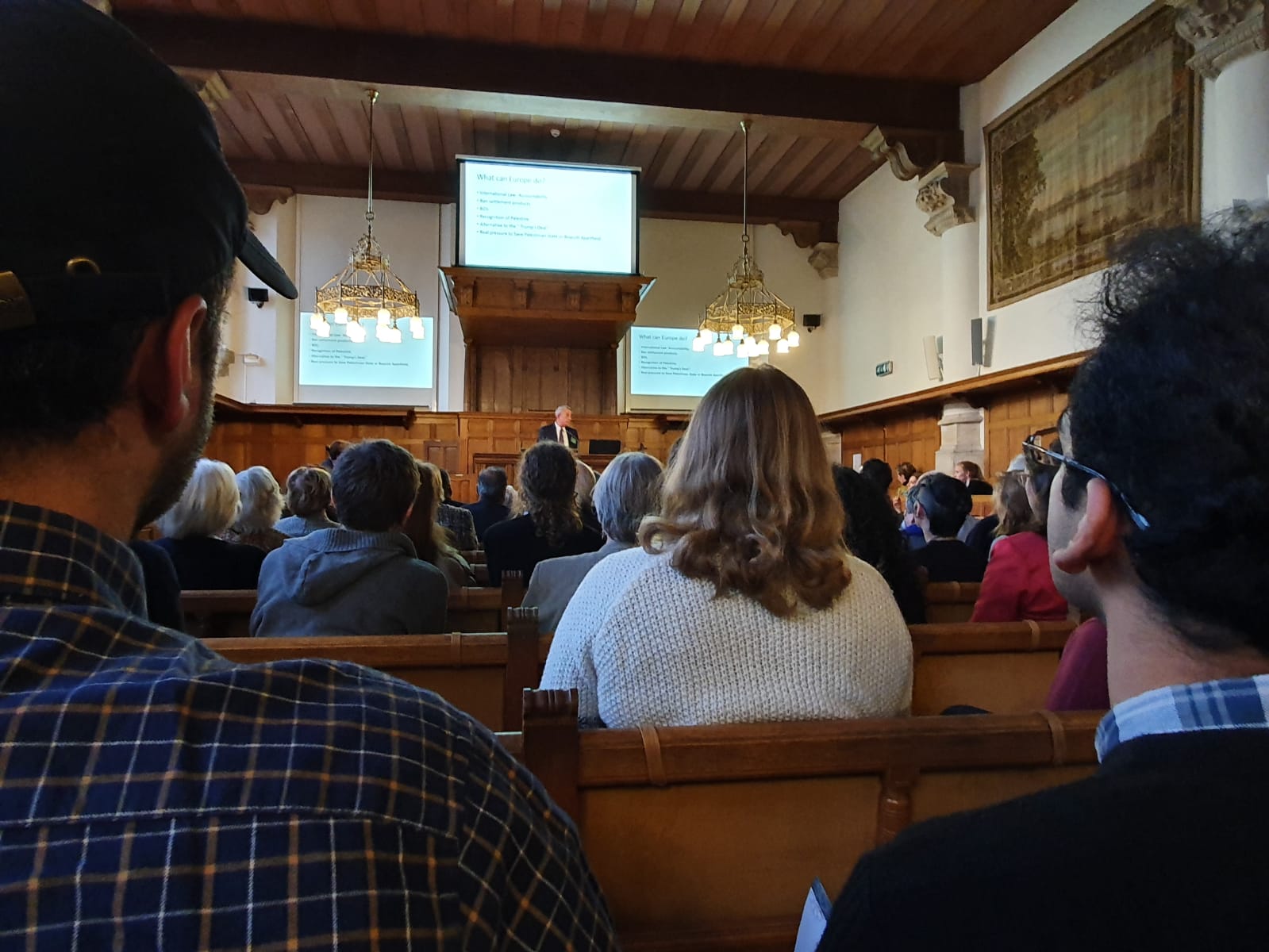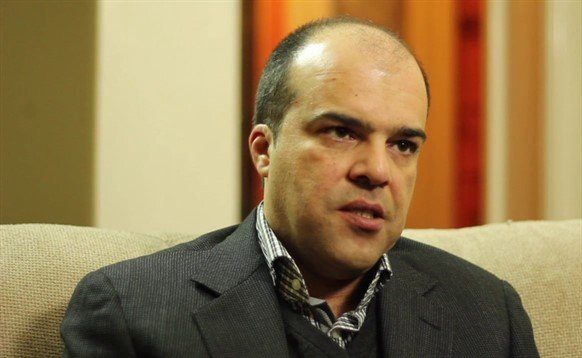Mouin Rabbani is een onafhankelijke Midden-Oosten-analist, gespecialiseerd in het Arabisch-Israëlische conflict en de kwestie-Palestina, en is Senior Fellow bij het Institute for Palestine Studies.
25 november 2019 Lees meer overIsraëls straffeloosheid in relatie tot het Palestijnse volk moet beantwoord worden met een eis vanuit Europa dat Israël verantwoording aflegt voor zijn acties. Het is nu tijd om actie te ondernemen, is de boodschap Mouin Rabbani. In dit opiniestuk, een weergave van zijn toespraak tijdens de bijeenkomst ter viering van het veertigjarige bestaan van de Lutfia Rabbani Foundation op 21 november 2019 in Den Haag, zet hij uiteen waarom.

The Palestinian cause, and the relationship between Europe and the Arab World, were issues particularly close to my late father’s heart, and I am therefore extremely pleased to have the opportunity to address these issues here today.
The Palestinian struggle for self-determination is currently experiencing a period of maximum danger. As we have seen in recent years, the United States, acting in intimate collusion with Israel, has advanced a number of unilateral initiatives intended to transform the Question of Palestine. These include US recognition of Jerusalem as the capital of Israel; de facto US recognition of exclusive Israeli sovereignty over the entirety of the Holy City; US recognition of Israeli sovereignty over the occupied Syrian Golan Heights; the US campaign to remove the Palestinian refugee question from the international agenda; the US formal adoption of the position that the occupied Palestinian territories are not occupied territories; and most recently the US declaration that Israel’s settlements in occupied territory, which are illegal under international law and in fact defined as war crimes by the Fourth Geneva Convention, are not illegal.
The purpose of these initiatives is to unilaterally resolve the core issues of the Israeli-Palestinian conflict, and thus the conflict itself, through the dismantling of the international consensus on the Question of Palestine, and replacing it with the principle that might makes right.
Those anticipating that these measures will conclude with the publication of a document outlining the so-called Deal of the Century, or indeed any diplomatic initiative, will be waiting in vain. Simply put, it does not exist. I have been spending quite a bit of time in Washington, DC in recent years, and one thing I have learned is that during the Trump administration, there is nothing that does not leak. Everything leaks, including even Trump’s secret hospital visits. The proposition that a US diplomatic initiative on the Question of Palestine is the only document that has not leaked, and is held so tightly that none are familiar with its contents, is simply not credible. The US diplomatic initiative is that which is being implemented on the ground before our very eyes. Nothing else exists in this regard.
While there is a clear agenda at work with respect to the Question of Palestine, this is also part of a broader effort by the Trump administration to dismantle the international system and its institutions. Washington has determined, probably correctly, that its open embrace of the most extreme Israeli agenda forms the most effective battering ram for its assault on the international system.
The European position is of course rather different. Europe claims to be an advocate for a rules-based international system, and engages in efforts to preserve it. Similarly, Europe claims to be promoting the application of the international consensus on a resolution of the Question of Palestine. This comprises an end to occupation, a two-state settlement, and a just resolution of the refugee question.
Perhaps the most important observation in this regard is that the international consensus is not self-implementing. It cannot be achieved through verbal declarations. Particularly under the current circumstances, I would argue that statements, devoid of action, are not just insufficient but in practice damaging, because they send a clear message of unpreparedness to undertake meaningful action to promote stated policy objectives.
Indeed the time has come for Europe to either undertake meaningful action, or accept responsibility for the consequences. In other words, put up or shut up. The window for further timidity has long closed.
In this respect several examples come to mind that help illustrate this point:
As you may recall, several years ago the European Union insisted that the Israeli government, at that point the most right-wing government in Israel’s short history, formally commit to the exclusion of the occupied territories, including East Jerusalem, from several agreements as a condition for European ratification. Israel responded with a political seizure of epic proportions, engaged in various threats and cheap demagoguery, and swore it would never accept the proposed terms. It was widely assumed Brussels would find a way to capitulate, but this time the EU held fast to its principles. And sure enough, once the Israeli government understood that Brussels was serious, its position collapsed faster than you can say Judea and Samaria. Which raises a more pertinent question: years earlier, the European Union incorporated an Israeli requirement to respect human rights into the EU-Israel Association Agreement. Yet, as Israel has derived enormous benefits from the Association Agreement, there has been no effort to invoke this clause. What is the point of writing rules if you have no intention of following them? Surely not the promotion of a rules-based international system.
More recently, as you know, the European Court of Justice adopted a ruling requiring that settlement products be clearly labeled as such in the European market. Understandably, this was met with widespread approval. But this ruling also raises more pertinent questions: why did it take Europe all of 52 years to state the obvious, particularly in view of the reality that the economic viability of the settlement enterprise is germane to the profitability, and therefore continuation, of the occupation? More importantly, why are settlement products permitted access to the European market at all? Would the ECJ permit the sale of blood diamonds in the European market if they were properly labeled by jewelers? Would “This ring contains a genuine blood diamond mined in the Democratic Republic of Congo” be considered a responsible business practice by the Court?
But even this mild slap on the wrist was too much for some. This week, the Dutch parliament adopted a motion that the ECJ ruling discriminates against Israel and should not be implemented until similar obligations are imposed on products entering the European market from other occupied territories. Imagine: Your house is robbed. You call the police. You tell the officer you were able to identify the robber because he has been causing trouble in the neighborhood since 1967. You provide the police with his name, address, and car license plate number. Then, in a fit of righteousness, the officer responds that the police will do nothing because it would be discriminating against this robber to arrest him while other thieves remain free. It goes without saying that those members of parliament who supported this motion acted shamefully and bought the chamber into disrepute.
Finally, you may be aware that The Netherlands, along with Belgium and Switzerland, recently suspended funding to UNRWA on account of serious issues of mismanagement within the agency that came to light. On the face of it the decision is perfectly understandable: public money should be spent responsibly, and unlike the United States, the governments concerned indicated that their support would be restored once the UN took remedial action to address the issues that had been raised. But if the decision to suspend payments to UNRWA was taken on the basis of proper management of public funds, where is this principle when Israel repeatedly and deliberately demolishes development projects funded by the Dutch and other European governments? Why is Israel permitted to act as it pleases with the European taxpayer without any consequence whatsoever?
The point is that Europe cannot credibly claim to advocate a rules-based international system if it refuses to apply the rules on which the international system is based. Even more so when it applies these rules selectively. In other words, Israel’s impunity in its relations with the Palestinian people must be replaced with a European demand for Israeli accountability for its actions. The window for timidity has long closed.
In Europe today, there is a view that the Question of Palestine is not a priority when it comes to Middle East policy. It is said that Syria, Yemen, and Libya present more urgent crises with a greater impact on European interests while the Israeli-Palestinian conflict has been around since the late 1940s and the sky has yet to fall in. Syria, Yemen, and Libya of course are urgent crises, and do have an impact on European interests. But the cause of Palestine remains the core regional issue, and Europe neglects it at its peril. And it is rather difficult to maintain that it has lost its urgency when for example the United Nations has projected that the Gaza Strip is on the verge of becoming unfit for human habitation.
In conclusion, there are compelling reasons to resolve the Question of Palestine that derive from the realities of the conflict itself. But in the current international environment, it also serves as a litmus test for the kind of world we want to live in, and indeed for the survival of a rules-based international system. It is no coincidence that the Nativist International has so strongly embraced Israel.

Waardeert u ons journalistieke werk? Help ons dat voort te zetten.